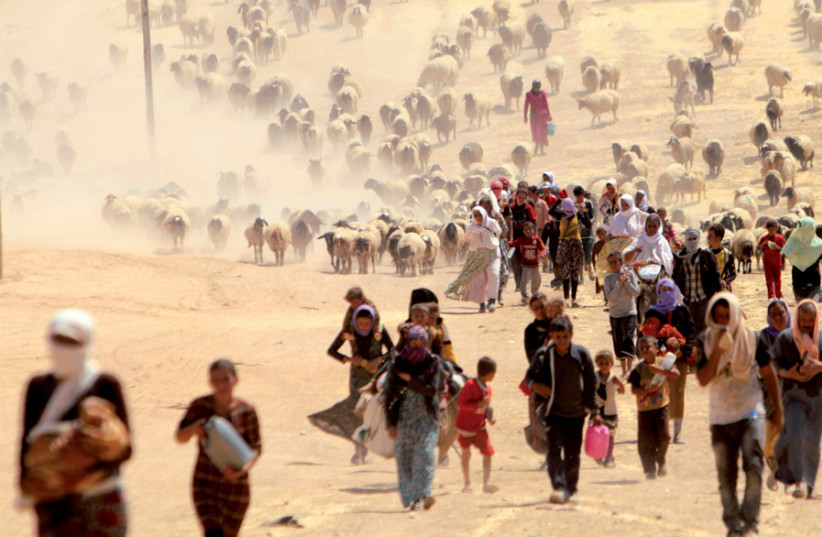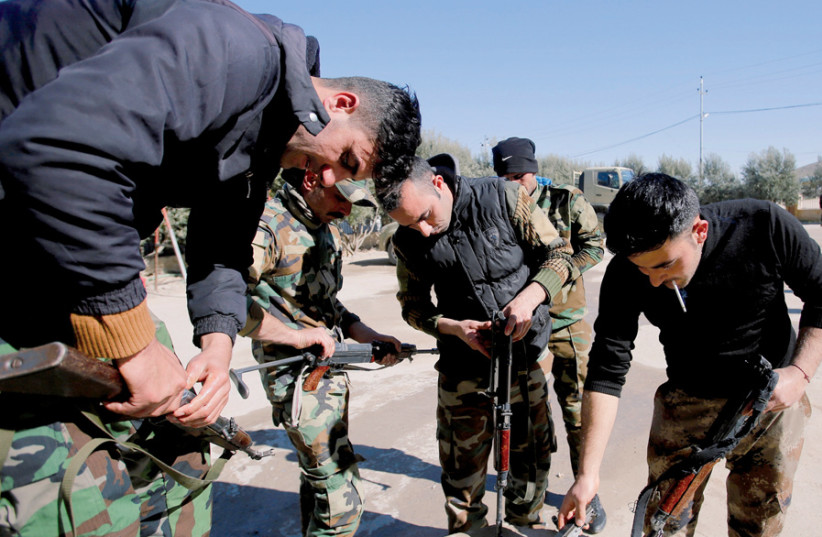Turkey has long harbored ISIS members and backed extremist jihadist groups in northern Syria, where it used them to ethnically cleanse Kurds, Yazidis and other minorities in 2018-2019.
SETH J. FRANTZMAN
AUGUST 21, 2021 21:33

As the world was focused on the crisis in Afghanistan, Turkey has been increasing its airstrikes on the Yazidi minorities in northern Iraq and attacking anti-ISIS fighters in eastern Syria.
Turkey has long harbored ISIS members and backed extremist jihadist groups in northern Syria, where it used them to ethnically cleanse Kurds, Yazidis and other minorities in 2018-2019.
Now Ankara appears to be trying to destabilize areas where ISIS was once active and where it committed genocide. This includes targeting the Christian community of Tel Tamr in Syria and the Yazidi communities in Iraq near Sinjar.
cnxps.cmd.push(function () { cnxps({ playerId: ’36af7c51-0caf-4741-9824-2c941fc6c17b’ }).render(‘4c4d856e0e6f4e3d808bbc1715e132f6’); });
It is not a coincidence that Turkey has targeted ethnic and religious minorities, but rather part of a hundred-year process of attacks on minorities in the country and the region by Turkish armed forces.
The latest round of attacks began last week and coincided with America and the world’s attention being drawn to Kabul.
Turkey killed four health workers in airstrikes in Sinjar, according to Rudaw. It targeted a health clinic in its attacks, and also claimed to be targeting “terrorists” which is the label it gives to local Yazidi activists aligned with the Sinjar Resistance Units or YBS.
These are members of the Yazidi minority who survived the ISIS genocide of 2014 and formed armed units to fight ISIS and save members of their community. They are akin to Jewish resistance fighters who resisted the Nazis in the forests of Belarus.

For Turkey, the resistance forces who fought ISIS are “terrorists” which they accuse of being linked to the Kurdistan Workers Party. There is no evidence from Turkey or any source that connects these Yazidi minorities with any terror attacks, anywhere.
Nevertheless, Ankara has been carrying out airstrikes on Sinjar since 2017, often killing Kurds and Yazidis. In one case, it carried out an airstrike targeting people coming back from a genocide memorial at Kocho.
THE LATEST round of strikes appears to be part of a ploy to continue keeping areas of Sinjar depopulated of Yazidis and make sure that the genocide ISIS committed has the long-term effect of ethnically cleansing Yazidis because they cannot return if their health clinics are bombed. Some 500,000 Yazidis fled in 2014 and most did not return and instead live in refugee and IDP camps.
The US State Department said that it is “aware of the press reports concerning the Turkish operations in northern Iraq. We reaffirm our view that military action in Iraq should respect Iraqi sovereignty.”
As Turkey was carrying out airstrikes on the health clinic and Yazidis in northern Iraq, it also increased attacks on Kurds in eastern Syria. According to reports, four members of the Kurdish-led Syrian Democratic Force (SDF) were killed in a Turkish bombardment in northeast Syria. The Turkish army “carried out an aerial attack on Tel Tamir’s Military Council base, killing four of our comrades, wounding others and causing material damage to civilian houses,” the SDF said in a statement.
It appears Turkey has been following closely the Taliban’s success in Afghanistan at ousting the US and thinks that it may be able to achieve the same thing in Syria. Ankara had pushed the Trump administration to withdraw from eastern Syria, where the US has backed the SDF in the battle against ISIS. Turkey claimed it would take over Kurdish areas as the US withdraws.
In Afrin in 2018, Turkey demonstrated how it would run those areas, ethnically cleansing 160,000 people and bringing in settlers from other parts of Syria to change the demography. When Trump ordered a partial US withdrawal in October 2019, Turkey did the same thing in Serekaniye, driving some 200,000 people from their homes.
Russia and Turkey then signed a deal to partition the areas the US and SDF had formerly held. Turkey’s goal is to get the US to leave eastern Syria and turn the region over to groups that are sympathetic to extremists like the Taliban, much as it has done in Afrin and Idlib. Ankara has been putting out positive messages towards the Taliban, and Turkish-backed extremist groups like Ahrar al-Sharaqiya, which the US sanctioned in late July, practice Taliban-like atrocities in northern Syria.
Turkey has also been doing outreach to the UAE and other countries, likely trying to chart the path to a post-American Middle East where Ankara intends to play a larger role in Iraq, Syria, Afghanistan and other states.
Ankara has shifted tactics from confronting the UAE, Egypt and other countries, to trying to work with them to discuss issues such as Libya and Iraq. Turkey is a key ally of Qatar, which has been hosting the Taliban. The airstrikes in Iraq and artillery attacks in Syria appear linked to a larger regional push.
Content retrieved from: https://www.jpost.com/middle-east/turkey-accused-of-bombing-medical-workers-anti-isis-fighters-677355.